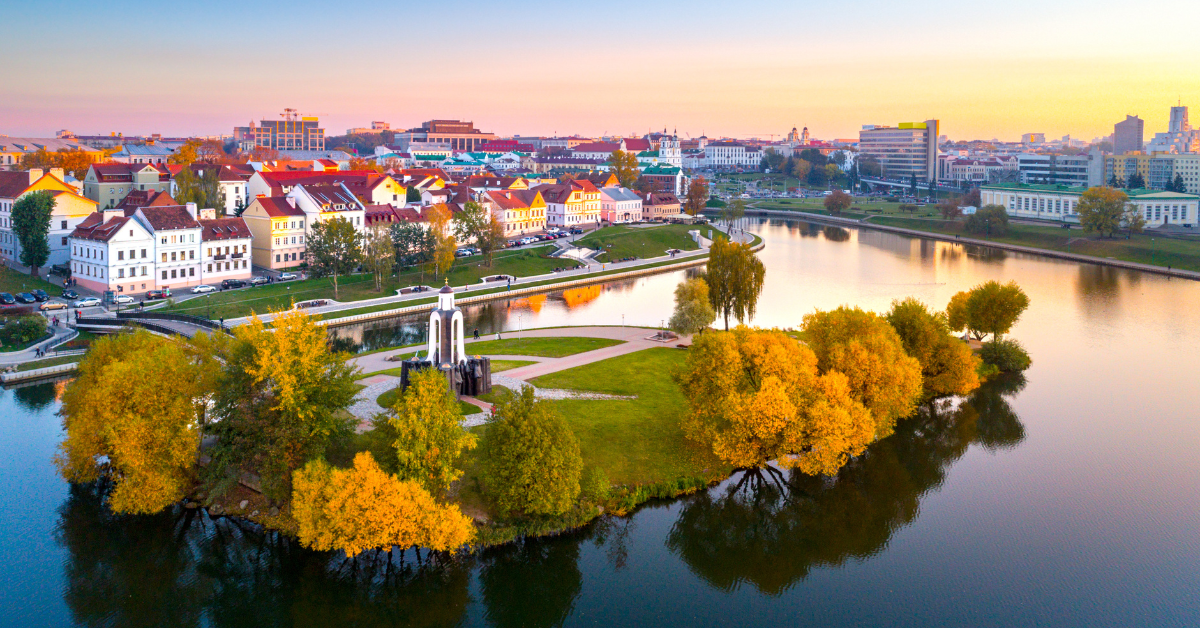The kanji representation of Belarus, “白露西亜 (Hakurojia)”, is more than just a translation. It combines linguistic roots with Japanese cultural aesthetics, giving the country a unique symbolic presence in Japanese perception. This article explores the origin of the expression, the images Japanese people associate with Belarus, and its ties to sports, food, and culture.
The Origin of the Kanji Expression “白露西亜”
In the local language, Belarus is written as “Беларусь (Belarus’).” “Bela” means “white,” while “Rus” refers to the Rus region. Based on this etymology, the Japanese expression “白露西亜” was created.
- 白 (White) … Symbolizes purity and cleanliness
- 露 (Ro) … A phonetic rendering of “Ru” in “Belarus”
- 西亜 (Seia) … Derived from the old kanji rendering of Russia, “露西亜”
In other words, “白露西亜” is a direct translation of “White Rus.”
Why It Is Also Called “白露 (Hakuro)”
Although “白露西亜” has a poetic sound, it is somewhat long, so it is often shortened to “白露 (Hakuro)”. The term “白露” is also a seasonal word in Japanese literature, meaning “cold morning dew” in autumn. Thus, for Japanese people, “白露” evokes ephemerality, clarity, and quietness, naturally associating these feelings with Belarus.
The Image Japanese People Have of Belarus
Belarus is not widely known in Japan, but through history and the media, certain images have become familiar.
| Image | Background |
|---|---|
| Rich in Nature | Forests and wetlands cover vast areas, earning it the name “the green heart of Europe” |
| Deep History | Traces its heritage back to Kievan Rus |
| Closeness to Russia | Strong cultural, linguistic, and political ties |
| Calm National Character | Considered modest and composed |
| Impact of Chernobyl | Part of its land was contaminated after the nuclear disaster |
These impressions have been reinforced through education and media, shaping the Japanese view of Belarus.
Belarus and Sports
Although a small country, Belarus is recognized as a sports nation. Through the Olympics and international competitions, Japanese awareness of Belarus has grown.
| Sport | Features | Recognition in Japan |
|---|---|---|
| Rhythmic Gymnastics | Multiple world medals, a traditional powerhouse | Highly respected by Japanese fans |
| Ice Hockey | A national winter sport | Gains attention in international tournaments |
| Soccer | Popular among younger generations | Has faced Japan in qualifiers |
| Athletics & Swimming | Featured in the Tokyo Olympics | Coverage raised public interest |
Especially in rhythmic gymnastics and ice hockey, Belarus has earned a reputation that serves as a gateway for Japanese people to learn about the country.
Belarusian Food Culture
Food also reflects Belarusian identity. The country’s cold climate has shaped a cuisine that often resonates with Japanese tastes.
| Dish | Description | Japanese Impression |
|---|---|---|
| Draniki | Potato pancakes | Familiar and comforting |
| Borscht | Beet-based red soup | Shares similarities with Russian cuisine |
| Kisel | Dessert made of boiled berries | Refreshing and tart |
| Black Bread | Traditional rye bread | Seen as healthy and wholesome |
The abundance of potato-based dishes is especially appealing to Japanese people, symbolizing a cuisine that is simple, hearty, and warm.
Arts and Culture in Belarus
Belarus also has a strong presence in arts and literature. Music, theater, and literature are widely recognized internationally.
| Field | Features | Global Recognition |
|---|---|---|
| Music | Ranges from folk to classical | Produced world-renowned pianists and conductors |
| Literature | Strongly reflects history and society | Includes a Nobel Prize laureate |
| Visual Arts | Often depicts nature and rural life | Considered part of the broader Eastern European school |
Especially in literature, translations into Japanese have helped highlight Belarusian perspectives on history and daily life.
Symbolism and Cultural Background of “白露西亜”
The expression “白露西亜” is not merely a phonetic translation but also a reflection of Japanese aesthetics. “白 (white)” implies purity, “露 (dew)” suggests delicacy, and “西亜” signals Belarus’s connection with Russia. Combined, these kanji give an impression of a quiet, modest nation.
The shorter form “白露” resonates with Japanese literature and poetry, symbolizing beauty and transience, and thus makes Belarus more approachable in Japanese perception.
Conclusion
The kanji expression “白露西亜 (Hakurojia)” faithfully reflects the etymology of Belarus while also incorporating Japanese cultural sensibilities. Its abbreviation, “白露 (Hakuro)”, carries literary and emotional resonance.
For Japanese people, Belarus is associated with rich nature, deep history, and ties with Russia, but also with sports, cuisine, and the arts.
Thus, the word “白露西亜” embodies more than a country’s name. It is a linguistic bridge that conveys history, culture, and emotion, enriching the way Japanese people understand Belarus.






